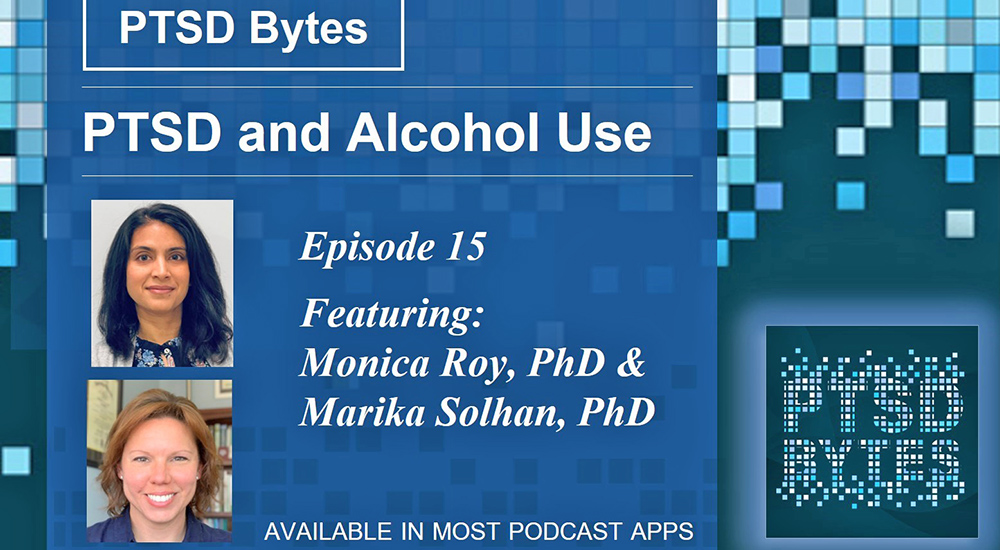Listen to “#15: PTSD and Alcohol Use” on Spreaker.
In this episode of PTSD Bytes, host Pearl McGee-Vincent discusses alcohol use and PTSD with Dr. Monica Roy from VA Boston and Dr. Marika Solhan from the Boston Vet Center.
PTSD Bytes: How are PTSD and alcohol use related?
Solhan says there is a strong relationship between PTSD and alcohol use. A person with PTSD may drink to manage their symptoms. People who drink might also be more vulnerable to traumatic experiences that cause PTSD. This does not mean it is the person’s fault if a traumatic event occurs.
While alcohol may help with stress in the short term, it actually can lead to PTSD symptoms getting worse in the long run.
PTSD Bytes: What is problematic drinking?
Problematic drinking is when a person has more than three or four drinks per sitting. For men, this means more than 14 or 15 drinks per week. For women, this means more than seven drinks per week.
Problematic drinking also occurs when the drinking has consequences in someone’s life, such as conflicts with family members or trouble at work.
PTSD Bytes: Treatment for problematic drinking and PTSD
Problematic drinking and PTSD can usually be treated at the same time. If someone becomes physically ill when they stop drinking, they may need medical attention first. Reducing drinking helps reduce symptoms of PTSD and reducing symptoms of PTSD helps reduce drinking. Use this link to locate VA facilities offering substance use treatment.
The three different options for treating problematic alcohol use are outpatient, intensive outpatient, and residential. Most VA medical centers and Vet Centers have therapists trained to help with problematic drinking. There are also community resources such as AA or SMART recovery.
Solhan emphasizes that while people may struggle with alcohol use and PTSD, long-term recovery from both is very possible.
 Digital resources for alcohol use
Digital resources for alcohol use
In addition to resources throughout VA and Vet Centers, there is also the VetChange mobile app. VetChange was designed for Veterans with problematic alcohol use and PTSD, but it can be used by anyone who wants to reduce their drinking.
VetChange offers personalized feedback about alcohol use, ways to cope with PTSD symptoms without using alcohol, strategies for managing urges to drink, and other self-guided coping skills.
Additional links:
- More information about PTSD and alcohol use on the National Center for PTSD website
- Substance Abuse and Mental Health Services Administration (SAMHSA) treatment locator
- Videos of Veterans, family members, and clinicians talking about their experiences with PTSD and alcohol
- More PTSD Bytes episodes
If you are a Veteran who is experiencing a crisis or supporting a loved one who is, dial 988 then press 1 for immediate assistance, or chat online at VeteransCrisisLine.net/chat.
Topics in this story
More Stories
Veteran Byron Potier weighed almost 300 pounds and was tired and lethargic. He was the perfect candidate for gastric sleeve surgery.
How much do you know about VA care, benefits and services? Don’t miss out on what you've earned—check out the "2025 VA Federal Benefits Guide for Veterans, Dependents, Survivors, and Caregivers" handbook to learn more.
Feeling stressed? Your breath can help you relax and focus. Take 3 minutes to reset and prioritize your well being for this week's #LiveWholeHealth practice.








Everyone I talked to in my unit has been rated with PTSD I did my 4 year’s got,other than honorable discharge no VA benefits your welcome for my service
Five o’clock….digital time….somewhere….over there.